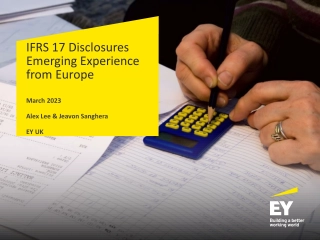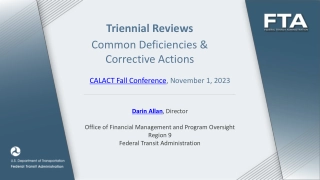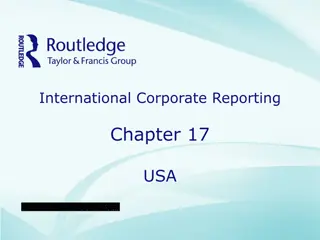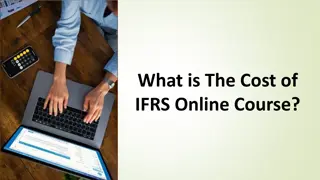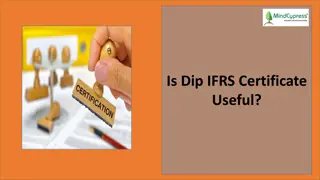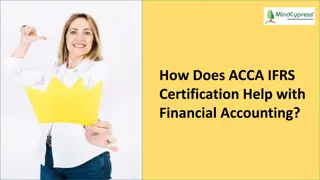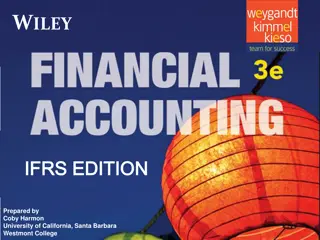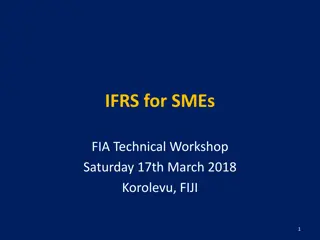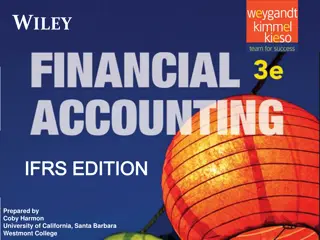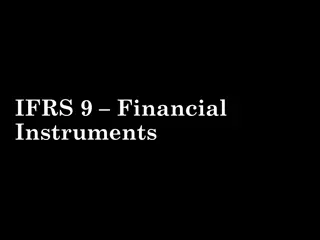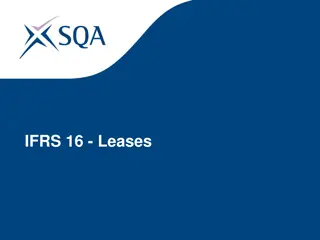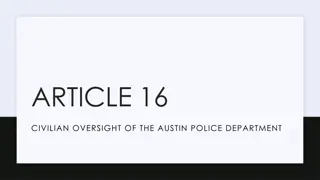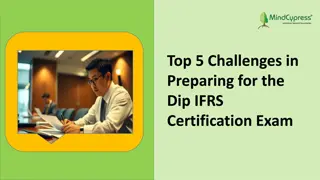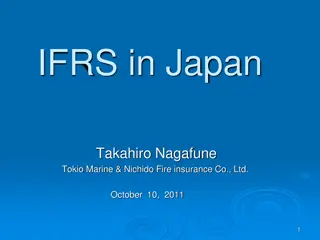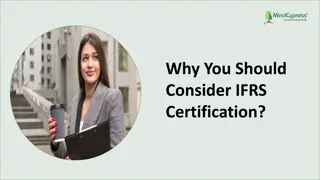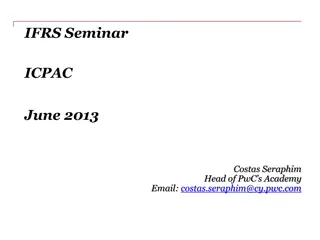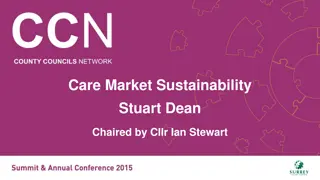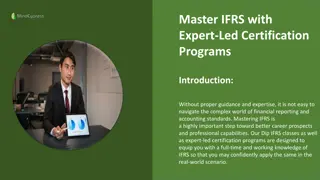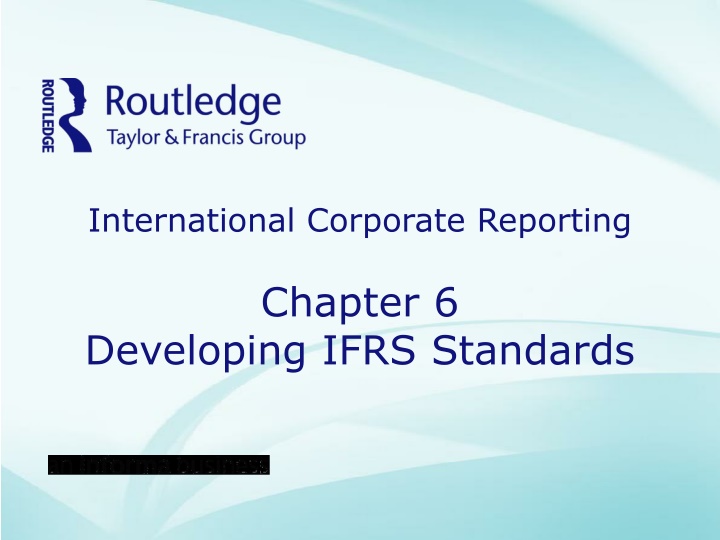
Developing IFRS Standards and IASB Oversight
The International Corporate Reporting Chapter 6 delves into the development process of International Financial Reporting Standards (IFRS) under the oversight of the IFRS Foundation. The foundation, comprising 22 trustees, ensures the independence of the International Accounting Standards Board (IASB), which replaced the International Accounting Standards Committee (IASC) in 2001. The IASB members, selected for their technical expertise and global experience, play a crucial role in setting accounting standards that impact the international business landscape. The involvement of various stakeholders, including the Monitoring Board, further enhances public accountability in countries enforcing IFRS. The qualifications and backgrounds of IASB members reflect a diverse mix of industry professionals, academics, and regulators, contributing to a well-rounded perspective in standard setting.
Download Presentation

Please find below an Image/Link to download the presentation.
The content on the website is provided AS IS for your information and personal use only. It may not be sold, licensed, or shared on other websites without obtaining consent from the author. If you encounter any issues during the download, it is possible that the publisher has removed the file from their server.
You are allowed to download the files provided on this website for personal or commercial use, subject to the condition that they are used lawfully. All files are the property of their respective owners.
The content on the website is provided AS IS for your information and personal use only. It may not be sold, licensed, or shared on other websites without obtaining consent from the author.
E N D
Presentation Transcript
International Corporate Reporting Chapter 6 Developing IFRS Standards
IFRS Foundation Oversees IASB. Independent body 22 trustees. Mix of trustees reflects geographical spread of world s capital markets. Raises funds for standard setting process.
Monitoring Board Demand to enhance public accountability in countries where regulators enforce IFRS. Formal link from trustees to public authorities EC, IOSCO (including IOSCO Growth and Emerging Markets Committee), Brazil, Korea, China, US, plus observer from Basel Committee. Participates in appointing trustees.
International Accounting Standards Board IASB Formed in 2001, replacing predecessor IASC 14 members appointed by IFRS Foundation trustees. Up to 3 may be employed part-time, remainder must commit all working time to IASB. 5-year term, renewable for a further five. Best available combination of technical skills, and experience of international business & market conditions. Geographical spread. Meets in public, agenda papers on website.
IASB membership at July 2019 Americas (4) United States (2) Canada Europe (4) Africa (1) Asia/Pacific (5) United Kingdom France South Africa China New Zealand Australia South Korea Japan Brazil Germany Netherlands 9 male and 5 female
Employment sector background of members (immediately prior to their appointment) Professional accountants/audit firm 3 Accounting academic Financial reporting and financial market regulators Banking/financial institutions Fund management Government administration. Industrial 3 3 2 1 1 1
Qualifications Subject area of highest academic qualification Accountancy/ Finance MBA/ Management Highest academic qualification Professional qualification 6 U/G 4 Chartered accountant/ CPA Chartered Financial Analyst 8 5 Masters 6 1 Law Economics Industrial relations 1 1 1 Doctorate 4
Involvement with accounting standard setting prior to appointment to IASB board membership International Accounting Standards Board Membership of IASB Interpretations Committee Advisory role with IASB 3 3 National accounting standard bodies Membership of a national accounting board Advisory role with a national accountancy board 7 4 (Five members are included in two of the categories of involvement. Two members are not included in any categories.)
Objectives of IASB to develop in the public interest, a single set of high quality, understandable and enforceable global accounting standards . to help participants in the world s capital markets and other users make economic decisions; to promote the use and rigorous application of those standards; and to bring about convergence of national accounting standards and IAS/ IFRS to high quality solutions.
Other support for IASB IFRS Interpretations Committee Responds to questions about interpretations of standards Publishes IFRIC Interpretation as guidance IFRS Advisory Council Forum for wider participation Meets twice per year Formal advisory body to IASB and trustees
Financing the IASB Annual report 2018 54% Voluntary contributions from jurisdictions. 17% Voluntary contributions from international accounting firms. 29% self-generated from sales of subscriptions, publications and licensing. Challenge to balance transparency, fairness and confidentiality Contributors listed in annual report
Due process 1. Setting the agenda. 2. Project planning. 3. Development and publication of a discussion paper. 4. Development and publication of an exposure draft. 5. Development and publication of an IFRS Standard. 6. Regular review and educational activities after an IFRS Standard is issued.
Time scale of due process for complex standards Project added to IASB agenda Discussion Paper issued First exposure draft issued Standard issued Effective date Time period IFRS 17 Insurance Contracts Sep 2001 May 2007 July 2010 May 2017 Jan 2021 19 years IFRS 16 Leases Jul 2006 Mar 2009 August 2010 Jan 2016 Jan 2019 13 years IFRS 15 Revenue from Contracts with Customers Jun 2002 Dec 2008 June 2010 May 2014 Jan 2018 16 years
Development of a standard, sources of information for researchers Supporting material: Overviews of the due process as it applies to the standard Snapshots of major documents. Consultation feedback: Comment letters received Project history: Timeline of all the stages of due process associated with the project. Project news: Press releases issued by IASB regarding the project. Meetings: Podcast of meetings relevant to the project.
Conceptual framework the objectives of financial statements; the qualitative characteristics that determine the usefulness of information in financial statements; financial statements and the reporting entity; the definition, recognition and measurement of the elements from which financial statements are constructed; and presentation and disclosure
Challenges to the IASB Small and medium-sized entities. Relation to US GAAP. Needs of emerging economies. Enforcement.
Small and medium-sized entities IFRS for SMEs issued 2009, relatively short document tailored to small companies. One document contains all accounting requirements for an SME. Argument against comparability lost if full standards not applied Argument for- focuses on information needs of lenders and creditors who fund SMEs, has regard to capacity of SME to produce financial information.
Relation to US GAAP US GAAP has provided an alternative to IFRS. US GAAP sometimes used in EU countries for group accounts prior to 2005. During 2000 s there were plans to converge IFRS and US GAAP, by IASB working with FASB. Project stalled after financial crisis 2008 and change of US President in 2009.
Main stages of convergence 1996-2007 1996 Act of Congress. Urges SEC to support the development of IAS Standards. 2002 Norwalk Agreement. Memorandum of Understanding. FASB and IASB pledge to make their two sets of regulations compatible. 2005 SEC sets out an agreed Roadmap for the elimination of a reconciliation to US GAAP for non US registrants on US capital markets who apply full IFRS Standards. 2006 SEC/ FASB/ IASB Roadmap for Convergence 2006 2008, Goals set, short and long term. 2007 Removal of requirement for reconciliations to US GAAP/ from IFRS Standards by foreign issuers listed in US.
Main stages of convergence 2008-2012 2008 (November) SEC Proposed Roadmap for the adoption of IFRS Standards by US companies from 2014 (with possible early adoption by some companies from 2009) 2009 Incoming President Obama. New political appointments in SEC- Less enthusiasm for adoption of IFRS Standards. 2011 Timeline removed for adoption of IFRS Standards for use by US companies. 2012 SEC: Final Report on Convergence work plan: No demand from US companies to have their main report under IFRS Standards but look at possibility of companies providing IFRS-based measure of profits as an additional item of information. IASB and FASB continue to work together to eliminate differences when in the best interest of the capital markets.
Needs of emerging economies Criticism that IASB serves the needs of developed economies and markets. G20 recommended more involvement from emerging economies in Standard setting. IASB Emerging Economies group. Agenda papers technical issues of IFRS implementation. Academic research provides more critical insight.
Enforcement IASB has no powers to enforce IFRS Standards. Regulatory mechanisms depend on strength of national jurisdictions both law and practice. Effective enforcement appears to lower cost of capital where IFRS Standards are applied. ESMA (Europe) reports annually on enforcement actions in member states. Statement of compliance with IFRS Standards. Statement of compliance with national standards that are asserted to comply with IFRS Standards.
International Federation of Accountants (IFAC) Established 1977 to strengthen worldwide accountancy profession. Has established: IAASB (auditing) IESBA (ethics) IAESB (education) IPSASB (public sector accounting standards) PIOB Public interest oversight for the above.
Research examples Transition to IFRS Standards- questionnaires and financial statement data. Financial reporting quality- accounting income and economic income under different incentives Use of IFRS by professional investors- interviews about use of financial statements. IFRS for SMEs Standard- interviews on use across jurisdictions. IASB s due process- analysis of focus groups and published documentary evidence.

